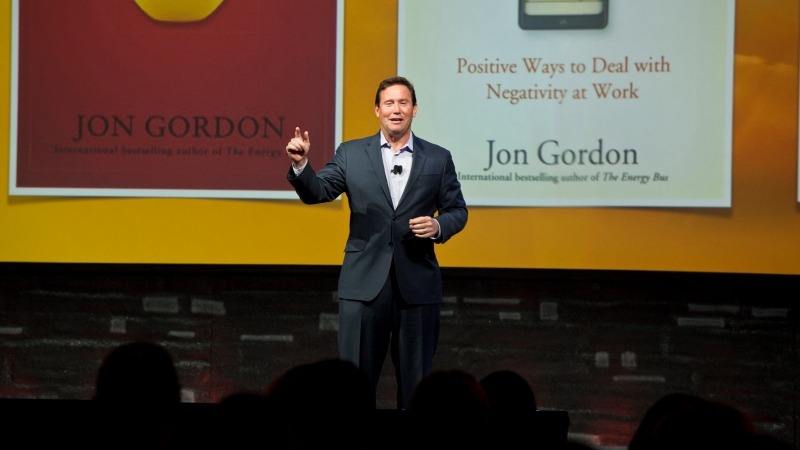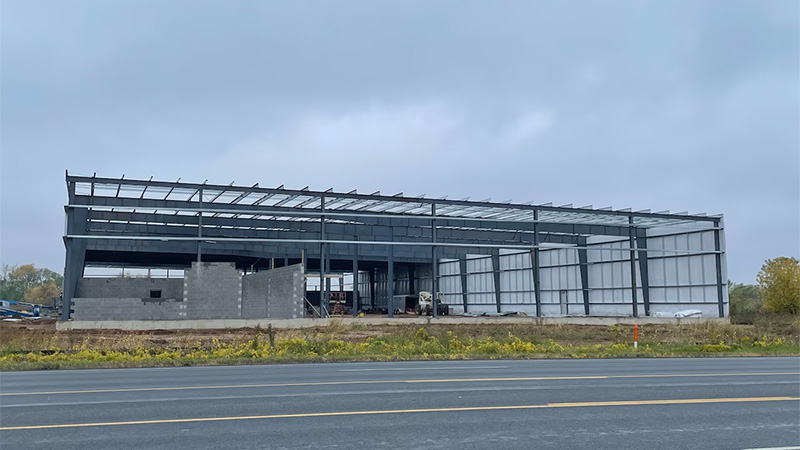HOP ON-BOARD JON GORDON’S ENERGY BUS
The science of physics explains energy as the capacity or power to do work. It can be seen by the human eye when one object makes another move or change with the application of force. Energy cannot be created or destroyed as Sir Isaac Newton pointed out for us, but it can be transformed from one type to another.
Energy exists in many forms. Kinetic energy moves objects. Thermal energy transfers heat. The movement of electrons causes electrical energy. Chemical energy brings change through interaction. Light carries radiant energy. Moving air produces sound energy. Changing atoms emit nuclear energy.
There’s also potential energy. Think of a copy of War and Peace lying on a table. It has potential energy. If a person walks by and knocks it off the table, the interaction between the book’s weight and its acceleration towards the floor because of gravity gives the volume kinetic energy. Energy from one object, the book, was transformed because of the action of another, the person.
Leaders take advantage of potential energy. The great ones have both the ability to take the potential of a team or group and put it into motion to achieve a specific purpose or goal, as well as spur others into action with their words and actions. Leadership motivates people and activates them to achieve a worthwhile purpose. Leaders such as Nelson Mandela, Winston Churchill, Eva Perón and Martin Luther King Jr. had purpose and energy. Purpose gives leaders energy, and their energy makes teams deliver results.
Bestselling author Jon Gordon whose works include The Energy Bus, Soup, The No Complaining Rule, Training Camp, and The Carpenter offers a different metaphor for living a life of energy and positivity—a life with purpose. “You are the driver of your bus, and therefore the most qualified to get that bus moving from where it is now to where you want it to go. No one else can drive it for you.” “Your bus” can be a project at work or home, a relationship or even a personal passion or hobby.
Get out the map.
When leaders know where they are going, they can get their bus headed in the right direction. It starts with desire and knowing what you want. Putting your hands on the wheel, turning the ignition on, and stepping on the gas in not enough. Vision, too, is critical in getting there. Vision is more than seeing the end destination; it is seeing all the steps that you need to take to get where you want to go.
Gordon penned The Energy Bus to get people moving in the right direction. He wrote it in three and a half weeks of what he calls, “God-inspired words.” When it was finished, he brought it to an agent, who took it to over 30 publishers—and every one rejected it. “I couldn’t give up. I had a vision and I kept on working towards it. Finally, John Wiley & Sons agreed to publish the book. Sometimes we have to step out and make our vision happen. So I went on a self-funded 28-city book tour.”
Gordon’s dream, or desire, was to share his energy through his book. And that’s what happened. “People began sharing the book, passing it around. Coaches shared it with other coaches. I started working with school districts, and teachers started using it in their schools. Then it caught on with businesses, and I started working with them.”
He is a real-life example of someone transferring their own energy. Riding alone can be lonely. You need to share your energy with others and bring them along on your journey. Energy attracts others and energizes them during the ride. Gordon should know. And, he’s had a lot of “riders.” Today, the impressive list of clientele seeking out his business consulting practice includes the Atlanta Falcons, LA Clippers, Pittsburgh Pirates, Campbell Soup, Wells Fargo, Northwestern Mutual, Publix, Southwest Airlines, Bayer and West Point Academy. Gordon and his tips have been featured on The Today Show, CNN, Fox and Friends and in numerous magazines and newspapers.
No hitchhikers allowed.
Gordon warns not to let everyone on the bus. “Not everyone is going to share your vision, and they will suck your energy—be ‘energy vampires’—if you let them. As a leader, your positive energy must be greater than all the negativity. Your certainty, belief, and faith must be greater than all the negativity and doubt.”
“We live in a world that loves to focus on the fruit of the tree—outcomes and numbers and stock-prices and wins and losses. But if we focus on the fruit and we ignore the root, what happens? The tree dies. If we invest in that root and we make it our number one priority, then we always have a great supply of fruit. So culture is your root. As leaders, you have to build this culture by what you think, by what you say, and by what you do on a daily basis. Culture drives expectations and beliefs. Expectations and beliefs drive behaviors. Behaviors drive habits, and habits ultimately create the future.”
Too much time spent looking in rearview mirrors will veer your bus off course. Don’t be afraid to let off “passengers” who are slowing you down. Don’t be afraid of bumps in the road, either.
Returning to his fruit tree analogy, Gordon explains, “As you’re growing as a leader, you will be pruned. If you’ve ever seen a bush that’s been pruned, it looks like it’s been destroyed, but it hasn’t. The pruning helps it grow more fully. It’s the same with us. We look like our life has been destroyed by a mistake, failure or setback. It looks like we’re done, but no. It’s not meant to destroy us, it’s meant to help us grow more fully. Our perspective during the growth stage—and pruning—determines whether we move to the harvest stage, the final stage where we receive the fruit of our efforts. Most people don’t come back from the pruning because they think they’ve been destroyed. But that challenge is not just a challenge; it’s an opportunity to learn, grow, improve, and get better.”
Gordon notes that teams that have great relationships have great resilience. Most teams break down because of poor communication, and when there’s no communication, negativity fills the gap. Use your horns and signals.
“Busyness and stress are the enemies of great leadership. When we’re so busy and stressed, it’s all about survival. We have to slow down. Be intentional. Once you’re aware, you’re able to be a more intentional leader, to communicate and create those relationships that are so important. Even more important, you’re able to connect. Connection is everything. Positive relationships are the difference between an average team and a great team. Then as part of those relationships, the next word that leaders live and breathe is that they serve. We have to serve. You don’t have to be great to serve, but you have to serve to be great. This is something I’ve had to learn, honestly, in my own life.”
So what is your purpose?
While you’re driving your bus, what drives you? “Purpose is the ultimate fuel for your life and career,” says Gordon. “When you and your bus are driven by purpose, you find the extraordinary in the ordinary, the passion in the mundane and the excitement in the everyday.” Purpose keeps your personal gas tank filled and gets you to the next station when you are running on empty. Purpose helps you get through that important client presentation when you’ve been up all night with your new baby. Purpose is what ultimately gets you to your destination.
Enjoy the ride.
One of Gordon’s favorite words is “meraki” which roughly in Greek translates as: to do something with love, to do something with soul, to do something with creativity, to leave a piece of yourself in your work, to leave something behind. Don’t drive the bus like you’re in “white knuckle” traffic on Interstate 405 in Southern California at 5:00 pm on Friday. He asks, “What are you leaving behind with your leadership? What legacy are you leaving? Knowing how you want to be remembered helps you decide how to live today.”
“Just think about it. What if everyone said, ‘I’m going to care more?’ What if every leader was driven by purpose, sharing their vision, leading with optimism, loving, serving and caring with a greater purpose? Think about the impact that they will have. Think about the difference that they will make. Great leaders, that’s what they do differently.”
Smile. And don’t forget to enjoy the scenery.




